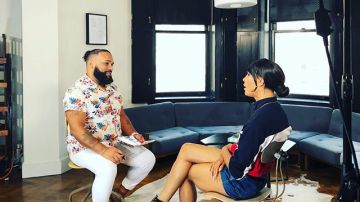New Youtube Series Focuses on Issues Affecting LGBTQ Youth of Color
The advent of social media has given a platform for marginalized communities but the openness found online doesn’t necessarily transfer to the real world and this newly launched Youtube series aims to bridge the gap

Photo: Instagram/lou_rok
The advent of social media has given a platform for marginalized communities but the openness found online doesn’t necessarily transfer to the real world and this newly launched Youtube series aims to bridge the gap.
For LGBTQ youth of color, conversations surrounding sexuality and acceptance remain difficult and Director of LGBTQ Health and Rights at Advocates of Youth, Louie Ortiz-Fonseca is helping confront the stigma with Kikis with Louie.
The series is a collaboration between Advocates For Youth, an organization that promotes sexual health programs and the MAC AIDS Fund. The title comes from the popular queer term” kiki” which is a shame-free conversation about life.
“While it was pretty scary for me at first, what helped to ground me was the young people who generously shared their hearts and stories as part of the project,” he tells HipLatina. That is what I love the most about Kikis, LGBTQ Youth are recording their history by sharing their stories.”
Since launching in November 2018. they’ve released nine episodes on topics including how to safely date online to surviving police encounters to proper pronouns. They’ve also interviewed activists, LGBTQ youth and celebrities like trans activist and Afro-Boricua actress MJ Rodriguez.
“Open and inclusive conversations about sexual health and healthy relationships are more important than ever; they will not only change attitudes, they’ll save lives,” said Nancy Mahon, global executive director of the MAC AIDS Fund. “The MAC AIDS Fund is thrilled to be part of this project with Advocates for Youth, which shines light on important issues for young folks around the country and encourages vulnerable conversations to happen.”
According to a report by the Human Rights Campaign, two-thirds of LGBT Latinx youth say they are more honest about who they are online.
Kikis with Louie confronts difficult conversation topics and helps empower not only LGBTQ youth but also provide the tools for allies and family members to participate in these discussions in real life.
“We’re grateful to be able to unpack subjects and host conversations that we know would’ve helped us as we were growing up,” Series Director and Senior Manager of Strategic Projects at Advocates for Youth Lincoln Mondy said. “At the core, that’s what makes Kikis with Louie what it is — we’re just trying to put what we so desperately needed in our youth out into the world.”
Episode eight, “Our Modern Family,” features Anita Revilla, associate professor at the University of Nevada Las Vegas, and her niece, Rae, discussing gender fluidity, acceptance within the family, and the importance of therapy.
Rae and her brother live with Revilla since her mother, Revilla’s sister, was diagnosed with bipolar disorder with schizoaffective features and asked for her sister’s help in taking care of her kids.
“Once I understood that mental illness, and our inability to heal it or treat it, was attacking my sister and our entire family, there was no doubt in my mind that we all needed to go to therapy to learn how to cope with the violence, depression, and trauma we all had experienced,” Revilla said, calling therapy a tool for survival as well as healing.
Normalizing therapy among Latinx is a key part of the discussion and a timely and relevant one, considering only 36 percent of Latinx with depression receive care.
Both Rae, 14, and Revilla identify as gender fluid and in the episode Revilla discusses her own mother confessing she was bisexual but married Revilla’s father because she was “expected to.”
The most difficult problem Latinx LGBTQ youth face is concern with family acceptance, according to a study by the Human Rights Campaign. They also found that LGBTQ Latino youth are twice as likely as non-LGBTQ Latino youth to feel like outsiders in the communities where they live.
“To parents who fear that their children will be queer because they fear that they will be discriminated upon, I ask them to question whether or not they are actually their children’s first discriminators. Parents can’t control other people’s reactions to their children’s queerness, but they do have the ability to stop themselves from discriminating against their own child. They also have the power to help their child live as their most authentic selves, fully embraced and celebrated,” Revilla said.
Rae believes young people need to “advocate for themselves” by getting involved in the community and local LGBTQ organizations: “We need to teach ourselves and others about our rights.”
The series comes at a time when 47.7 percent of gay, lesbian, and bisexual students report that they’ve seriously considered attempting suicide.
“I hope that ‘Kikis’ does two things for POC communities: 1. Reflects all the ways LGBTQ youth feel safe in their communities and families and 2. Learn new ways to be supportive of LGBTQ youth,” Ortiz-Fonseca said.
This, according to Ortiz-Fonseca, is part of the beauty of the show as it provides a model for intergenerational conversations on topics that can be awkward or uncomfortable.
The most-watched episode so far features Reggie Bullock of the Detroit Pistons talking about how he became an ally following the murder of his trans sister Mia Henderson in 2014.
They discuss Bullock’s lack of awareness about the transgender community growing up in the ‘90s and his determination to raise awareness about trans rights following her death.
“I think we don’t hear enough about the journeys that people have to allyship. No one is born with all of the information. We have to learn it and sometimes it’s because of a great loss,” Ortiz-Fonseca said.
This episode also stood out to Mondy who said Bullock challenged the assumptions he had regarding pro athletes and their support for trans rights.
“I didn’t expect how open he would be — especially regarding how he wished he could’ve been more affirming of Mia while she was alive,” he said. “That episode sticks with me because it’s exactly what we’re trying to do with ‘Kikis’ — make space for difficult conversations in a low-pressure environment”
The series will run through September 2019 with a new video release every other week.
“I hope after watching Kikis with Louie, viewers are more comfortable taking these conversations offline and in their communities. Specifically, I hope LGBTQ youth of color understand that they’re worthy of joy and love,” Mondy said.

















